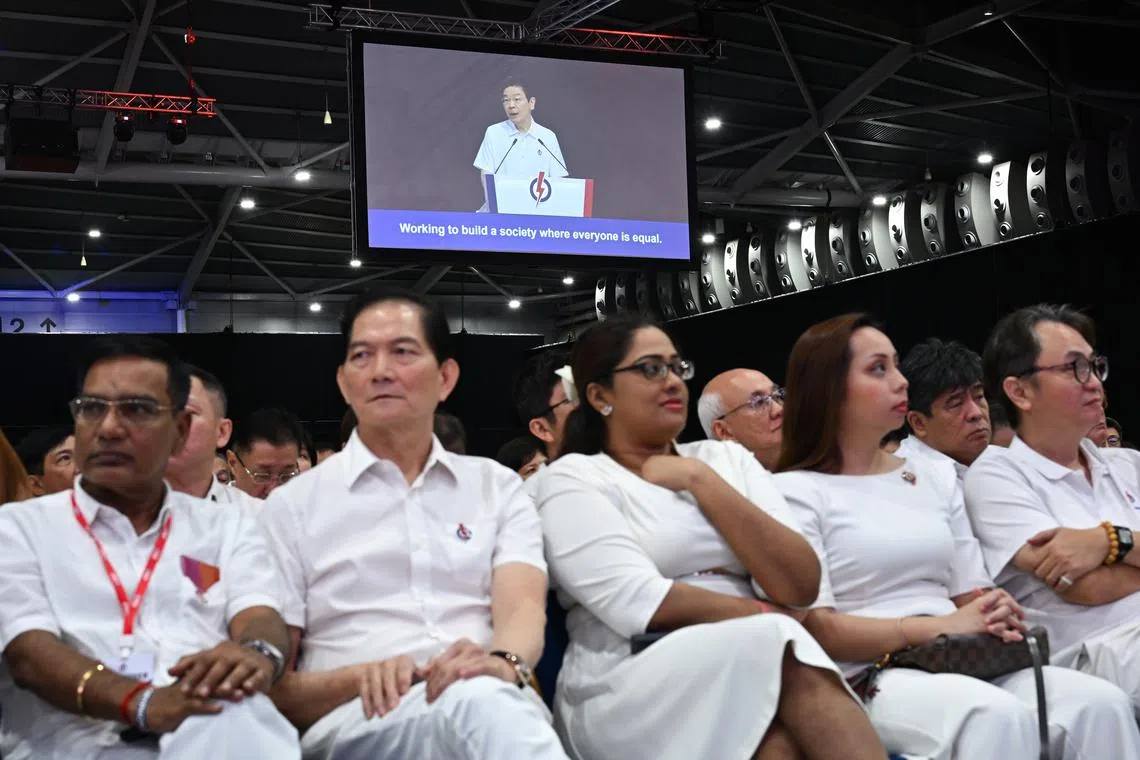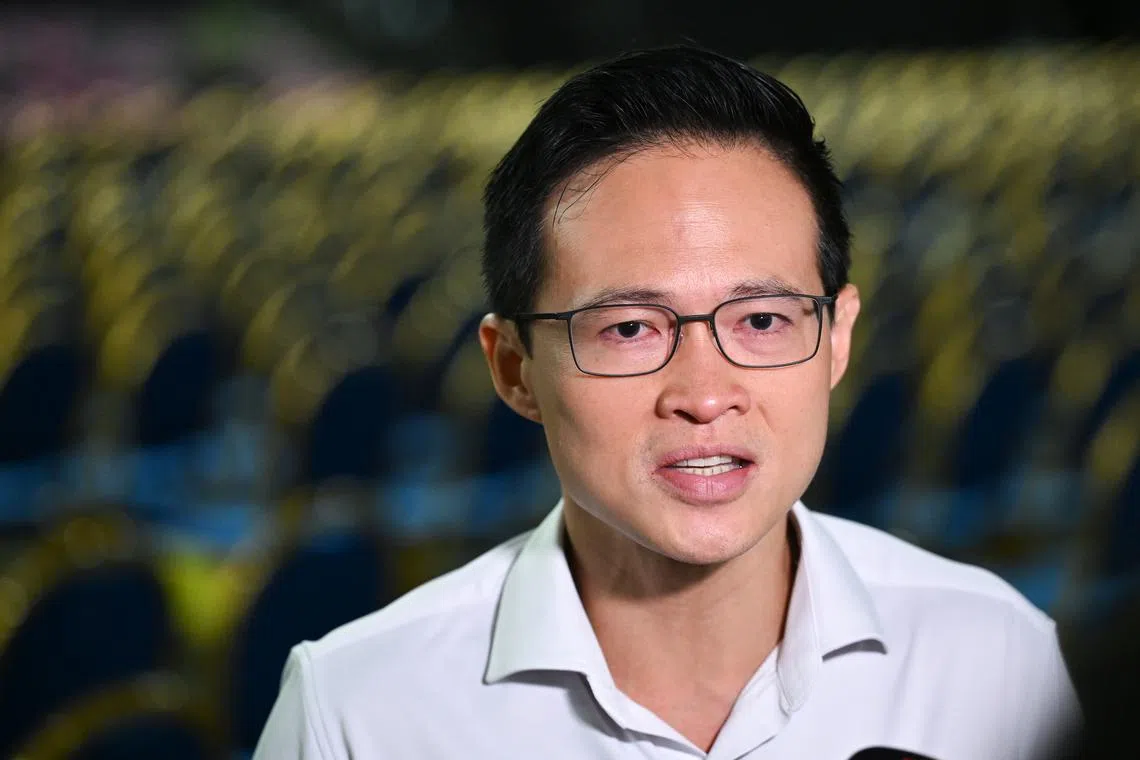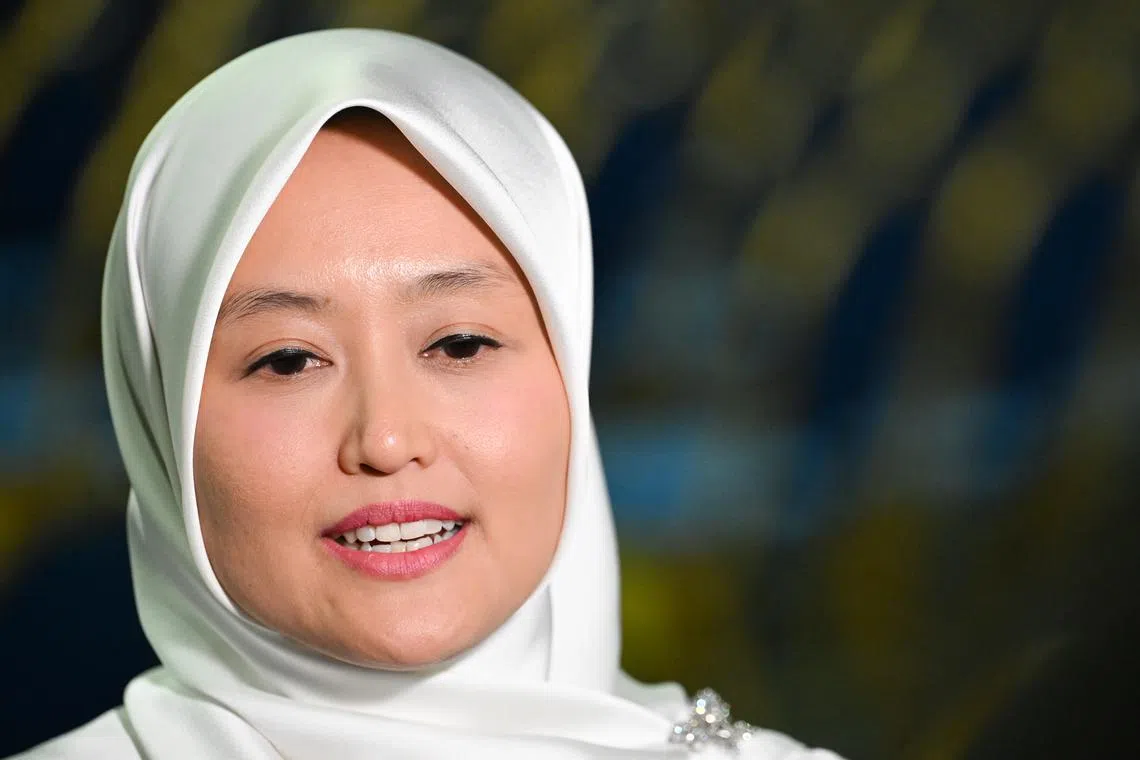PM Wong’s speech a call for activists to go beyond grassroots work and explain policies: Observers
Sign up now: Get ST's newsletters delivered to your inbox

Prime Minister Lawrence Wong issued a rallying cry to the PAP rank and file on Nov 24, calling on them to be front and centre working the ground for the next general election.
ST PHOTO: LIM YAOHUI
SINGAPORE - Bringing the People’s Action Party (PAP) “out in front” means getting party activists to go beyond grassroots work and step up efforts to explain policies, said political observers.
It also means the ruling party needs to rally Singaporeans behind its ideas, rather than just government policies and the outcomes, they added.
Prime Minister Lawrence Wong issued a rallying cry to the party rank and file
This seems to be a fresh perspective, said Dr Gillian Koh, a senior research fellow at the Institute of Policy Studies.
She noted that the incoming PAP secretary-general’s message could see activists being more upfront in engaging citizens, explaining policies, and soliciting feedback and ideas.
To do this, they would need a clear grasp of the party manifesto and how it translates to government policies, beyond the usual grassroots connections, she said.
Dr Koh added that this could also be a signal that party members will get more leeway to talk about the pros and cons of policy positions across the spectrum.
Echoing the sentiment, Singapore Management University law don Eugene Tan said it is significant that PM Wong made clear the distinction between party and government in rallying for the party to be “out in front”.
This means the PAP must contest not just as the incumbent Government, but more as the political party that has governed Singapore since 1959, he said.
Campaigning from the position of the incumbent Government places a stronger focus on policies and outcomes, but a potential downside is that this does not necessarily lead to strong bonds with the people.
On the other hand, campaigning as a political power can help rally Singaporeans behind the party’s cause, values and ideals, he said.
PM Wong’s speech also took on the cost-of-living hot potato
Dr Koh said recurring gripes about the cost of living are significant, as this is where political and policy pressures can clash.
PM Wong had also called for Singaporeans to remain united in a dangerous world
Associate Professor Bilveer Singh, who is from National University of Singapore’s political science department, said he expected to hear more on topics such as the rise of strongman politics, nationalism and deglobalisation.
These trends have been seen in other countries and can hurt Singapore and livelihoods here, he said.
Raising these issues could be a way for PM Wong to rally Singaporeans behind the Government against outside pressures, he said.
“It is not about PAP any more but Singapore and its future,” said Dr Singh.
Next election ‘most consequential’
The next election will be a key fight for the PAP, given voters’ growing appetite for more political diversity, along with a drop in enthusiasm for one-party dominance, observers said.
Associate Professor Tan noted that a bad outcome for the PAP would be the loss of a few more current or prospective political office-holders.
Dr Mustafa Izzuddin, a senior international affairs analyst at Solaris Strategies Singapore, noted that PM Wong underscored the importance of the electorate voting for the PAP if they believe in the ruling party governing the country, rather than being enticed to vote for the opposition because they want more diverse voices.
He added that PM Wong’s “strategically calibrated, quasi-electioneering” speech indicates that the PAP will continue its focus on bread-and-butter issues and cost-of-living challenges to capture as many votes as possible.
Dr Singh said the PAP will have to survive the “70-year itch” for political parties, referring to when people “get sick and tired” of the incumbent and attribute anything that goes wrong in the country to it.
“The PAP has to prove that it is able to appreciate, understand and respond to the rumblings on the ground,” he added.
New leadership line-up shows focus on continuity
On Nov 24, the PAP’s inner circle also voted for its central executive committee (CEC), returning 11 out of 12 who were elected in 2022
The absence of major changes to the party’s top decision-making body shows it is focused on continuity and stability, observers said.
But the few tweaks to the line-up could provide an indication of future Cabinet appointments under PM Wong’s watch, they added.
Transport Minister Chee Hong Tat – the only new addition – was co-opted along with Manpower Minister Tan See Leng as the next two highest vote-getters.
While fourth-generation (4G) leaders make up the majority of the slate, observers highlighted two notable shifts in cadres’ voting preferences.
These were the inclusion of Mr Chee and the rise of Minister for Culture, Community and Youth Edwin Tong, who was co-opted two years ago but part of the top 12 this round.
Twelve of the usual 18 who eventually make up the party’s policymaking body are voted in by its cadres at the biennial party conference. The CEC then traditionally co-opts the two next highest vote-getters on the same day, and another four members after its first meeting.
Mr Chee’s inclusion in the CEC “marks his exponential rise within the PAP, which sees him as crucial to the party’s future under PM Wong’s leadership”, said Dr Mustafa.
Mr Chee, who took up the transport portfolio in the wake of a corruption probe into his predecessor S. Iswaran, has impressed the party cadres, given that he was just shy of gaining an outright seat on the CEC, said Prof Tan.
Party members told reporters on Nov 24 that the new slate is made up of trusted people with deep experience.
It also includes ministers in their first term, showing that the transition between the third and fourth generation of leaders is going well, said Tampines GRC MP Desmond Choo.

Tampines GRC MP Desmond Choo speaking to the media at the PAP conference on Nov 24.
ST PHOTO: LIM YAOHUI
“PM Wong was very frank that his leadership style is an inclusive one. He’s looking forward to bringing in people across the ranks, especially younger ones coming in.
“That to me, is a strong message to Singaporeans that he is prepared to look for ideas, talent… (and) people with a heart to serve from across the ranks and across the different demographics,” said Mr Choo.
Minister of State for Health and Digital Development and Information Rahayu Mahzam said there is a good balance of getting new people in, but also having the stability of keeping those who are more senior.
“That is the modus operandi that we have used, and I hope that that’s something we can carry on in years to come,” she added.

Minister of State for Health and Digital Development and Information Rahayu Mahzam speaking to the media at the PAP conference on Nov 24.
ST PHOTO: LIM YAOHUI
Left off the list after the ballot was Minister for Digital Development and Information Josephine Teo.
But observers were certain that she would be among those co-opted at the CEC’s first meeting. In 2022, she was co-opted as one of the two highest vote-getters after the first 12.
The CEC’s first meeting is usually held within weeks of the election. It is at this meeting where appointments each member will hold will be determined.
Dr Mustafa said Mrs Teo is likely to be co-opted at this meeting as she is considered a valuable member of PM Wong’s 4G team and is an anchor minister in Jalan Besar GRC.
Prof Tan added that the CEC elections are clearly competitive, and there are more Cabinet ministers than CEC positions.
Another person likely to be co-opted is labour chief Ng Chee Meng, who was also co-opted in 2022.
This would be expected given the close relationship between the PAP and the NTUC, and Mr Ng’s potential candidacy in the next election, said Dr Mustafa.
Mr Ng had contested and lost in Sengkang GRC in 2020, and held various ministerial portfolios before that including minister for education (schools).
However, it is also possible that Mr Ng is replaced by another labour MP, or that two National Trades Union Congress leaders may be co-opted this round, said the political observers.
Prof Tan highlighted Senior Minister of State in the Prime Minister’s Office Desmond Tan as a name to watch. The deputy secretary-general of the NTUC was among the 19 names on the ballot at the conference, but was not voted into the committee.
Mr Tan could be co-opted to the committee along with Mr Ng, said Prof Tan.


